Seeing as how the entirety of organic history exists thanks to communication — even rudimentary chemical exchanges between cells qualify — it makes perfect sense that many find the concept utterly engaging. Language pervades everything, building and destroying as time marches ever forward. And while even the most learned scholars can't even begin to fully explain its physiology, origins, structures and pretty much every other component, they've certainly done a pretty lovely job scratching the surface. Maybe a subcutaneous layer or two. While far more illuminating reads beyond these sit on the shelves, crammed with gripping concepts, the following provide a fantastic introduction. Diverse perspectives and suggestions abound, but don't think these necessarily represent all the possible answers!
-
Why You Say It by Webb Garrison:
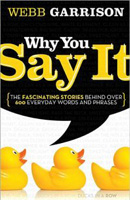 As one can probably ascertain from the title, Why You Say It explores the unusual (if not outright unexpected) origins of various English idioms. Over 600 figurative phrases — some widespread, some rare — come alive through Webb Garrison's fascinating research. History and anthropology buffs, too, have plenty of interesting information to peruse, seeing as how these subjects inextricably tie into linguistics.
As one can probably ascertain from the title, Why You Say It explores the unusual (if not outright unexpected) origins of various English idioms. Over 600 figurative phrases — some widespread, some rare — come alive through Webb Garrison's fascinating research. History and anthropology buffs, too, have plenty of interesting information to peruse, seeing as how these subjects inextricably tie into linguistics. -
Eats, Shoots & Leaves: by Lynne Truss:
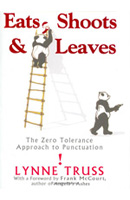 English language enthusiasts mourning its frequent abuse will probably find this book quite the comfort! Here, the author mourns linguistic apathy, particularly when it comes to proper punctuation use, and the myriad ways such mistakes can completely alter a sentence's meaning. Regardless of whether or not they speak the British, Canadian, Oceanic or American dialects, readers can nod sadly along.
English language enthusiasts mourning its frequent abuse will probably find this book quite the comfort! Here, the author mourns linguistic apathy, particularly when it comes to proper punctuation use, and the myriad ways such mistakes can completely alter a sentence's meaning. Regardless of whether or not they speak the British, Canadian, Oceanic or American dialects, readers can nod sadly along. -
The Language Instinct by Steven Pinker:
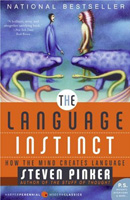 Pick up this MIT professor's lauded work explaining the psychological and cognitive functions that might lurk behind language formation and acquisition. Because scientists and linguists continue arguing over the complex biology of communication, any interested parties should explore the various perspectives. Steven Pinker stands at the forefront of such research, blending different disciplines together into one stimulating package.
Pick up this MIT professor's lauded work explaining the psychological and cognitive functions that might lurk behind language formation and acquisition. Because scientists and linguists continue arguing over the complex biology of communication, any interested parties should explore the various perspectives. Steven Pinker stands at the forefront of such research, blending different disciplines together into one stimulating package. -
Spoken Here by Mark Abley:
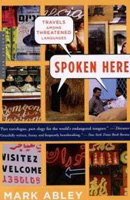 Just like organic matter, languages evolve over time to suit specific needs, and end up on their respective endangered or extinct lists. Here, a journalist explores some of the world's tongues currently (at the time of its 2005 publication, of course) tottering on obscurity and obliteration. But seeing as how that entails a tragically staggering 90% of 6,000 known languages, he can't exactly cover them all.
Just like organic matter, languages evolve over time to suit specific needs, and end up on their respective endangered or extinct lists. Here, a journalist explores some of the world's tongues currently (at the time of its 2005 publication, of course) tottering on obscurity and obliteration. But seeing as how that entails a tragically staggering 90% of 6,000 known languages, he can't exactly cover them all. -
The F-Word edited by Jesse Sheidlower:
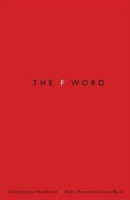 To put it bluntly, The F-Word dissects the anatomy of an obscenity and chronicles some of its most notorious and notable appearances. An open mind is all it takes to learn more about what goes into establishing and using a profane word many still deem super harsh. And, of course, how frequent use dulls its initially rough edges until general acceptance settles.
To put it bluntly, The F-Word dissects the anatomy of an obscenity and chronicles some of its most notorious and notable appearances. An open mind is all it takes to learn more about what goes into establishing and using a profane word many still deem super harsh. And, of course, how frequent use dulls its initially rough edges until general acceptance settles. -
Mother Tongue by Joel Davis:
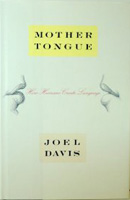 Science, history and linguistics (duh) collide in another highly informative glimpse at how language happens and, of course, evolves. For the most part, however, Joel Davis emphasizes the ways in which these subjects relate back to English. Any speakers wanting to know how it started meandering away from Germanic tongues would do well to check out this incredibly detailed book.
Science, history and linguistics (duh) collide in another highly informative glimpse at how language happens and, of course, evolves. For the most part, however, Joel Davis emphasizes the ways in which these subjects relate back to English. Any speakers wanting to know how it started meandering away from Germanic tongues would do well to check out this incredibly detailed book. -
The Elements of Style by William Strunk and E.B. White:
 And now for something a little different: one of the most classic English language writing guides ever published! With multiple editions available since its 1918 release, "Strunk & White's" allows language lovers to watch how formalized authorship changed over the better part of a century. Obviously, the reference piques its own critics, but that doesn't diminish its influence and importance any.
And now for something a little different: one of the most classic English language writing guides ever published! With multiple editions available since its 1918 release, "Strunk & White's" allows language lovers to watch how formalized authorship changed over the better part of a century. Obviously, the reference piques its own critics, but that doesn't diminish its influence and importance any. -
The Power of Babel by John McWhorter:
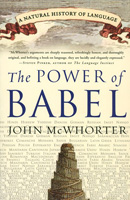 Berkeley linguistics professor John McWhorter outlines the five different methods by which language families evolve. Working from the very popular tree model, he explores concepts behind dialects and vernaculars within more mainstream tongues. Despite the author's academic pedigree, content comes relayed in a manner general audiences will probably understand.
Berkeley linguistics professor John McWhorter outlines the five different methods by which language families evolve. Working from the very popular tree model, he explores concepts behind dialects and vernaculars within more mainstream tongues. Despite the author's academic pedigree, content comes relayed in a manner general audiences will probably understand. -
The Unfolding of Language by Guy Deutscher:
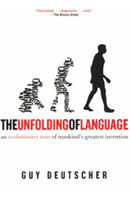 Tracing linguistic changes from the first appearance of humans up to 2006 obviously encompasses considerable head-swirling concepts, but Guy Deutscher delivers! The Unfolding of Language argues that working backwards might unlock mysteries of language structures past. A fascinating perspective even detractors should consider when researching English and more.
Tracing linguistic changes from the first appearance of humans up to 2006 obviously encompasses considerable head-swirling concepts, but Guy Deutscher delivers! The Unfolding of Language argues that working backwards might unlock mysteries of language structures past. A fascinating perspective even detractors should consider when researching English and more. -
Don't Sleep, There are Snakes by Daniel L. Everett:
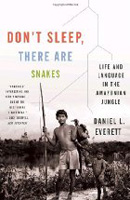 Travel deep inside the Amazon rainforest and learn all about some indigenous peoples and how they communicate. Piraha exists as a nearly autonomous, unique linguistic entity separate from all others, therefore providing a largely undisturbed look at how language and thought interact. And, of course, influence one another, though they seem caught in a perpetual "chicken and egg" scenario.
Travel deep inside the Amazon rainforest and learn all about some indigenous peoples and how they communicate. Piraha exists as a nearly autonomous, unique linguistic entity separate from all others, therefore providing a largely undisturbed look at how language and thought interact. And, of course, influence one another, though they seem caught in a perpetual "chicken and egg" scenario. -
Metaphors We Live By by Mark Johnson and George Lakoff:
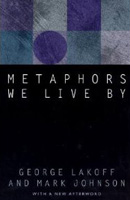 Figurative language can hold just as much sway over how humans perceive the world as its literal counterpart. In fact, metaphorical speech might very well influence cognitive science and development! Though only a theory, the authors certainly create a thoroughly compelling (and now widely accepted) case about the relationship between mind and tongue.
Figurative language can hold just as much sway over how humans perceive the world as its literal counterpart. In fact, metaphorical speech might very well influence cognitive science and development! Though only a theory, the authors certainly create a thoroughly compelling (and now widely accepted) case about the relationship between mind and tongue. -
Kant and the Platypus by Umberto Eco:
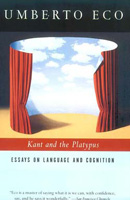 Writerly Renaissance man Umberto Eco philosophizes on semiotics, semantics and etymology as only he can. Using humble platypodes and their complete confounding of the biologists what stumbled across them, he explores how description shapes perception. And, of course, eventually goes on to permanently. influence philosophy and other metaphysical subjects.
Writerly Renaissance man Umberto Eco philosophizes on semiotics, semantics and etymology as only he can. Using humble platypodes and their complete confounding of the biologists what stumbled across them, he explores how description shapes perception. And, of course, eventually goes on to permanently. influence philosophy and other metaphysical subjects. -
The Architecture of Language by Noam Chomsky:
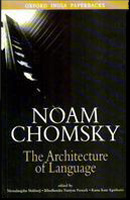 Mainstream audiences tend to think of Noam Chomsky as a sharp political commentator, but scholars know him as the heavily influential MIT linguist. His "generative enterprise" strategy for approaching the subject blended cognitive science with language studies. In The Architecture of Language, Chomsky traces its history, tenets and the way it shape the field forever.
Mainstream audiences tend to think of Noam Chomsky as a sharp political commentator, but scholars know him as the heavily influential MIT linguist. His "generative enterprise" strategy for approaching the subject blended cognitive science with language studies. In The Architecture of Language, Chomsky traces its history, tenets and the way it shape the field forever. -
Cunt by Inga Muscio:
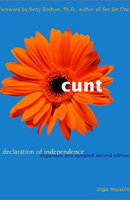 It doesn't take a sociologist to understand why marginalized demographics re-appropriate slurs and shift their nature from offensive to empowering. Initially a positive term, "cunt" eventually transformed into something ugly and insulting, reflecting misogynistic undercurrents present in even allegedly "civilized" cultures. Here, Inga Muscio makes a case for seizing the word back and baptizing it anew as a proud feminist battle cry.
It doesn't take a sociologist to understand why marginalized demographics re-appropriate slurs and shift their nature from offensive to empowering. Initially a positive term, "cunt" eventually transformed into something ugly and insulting, reflecting misogynistic undercurrents present in even allegedly "civilized" cultures. Here, Inga Muscio makes a case for seizing the word back and baptizing it anew as a proud feminist battle cry. -
Grammar Girl's 101 Misused Words You'll Never Confuse Again by Mignon Fogarty:
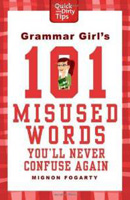 Pick up this guide by grammar goddess Mignon Fogarty and avoid malapropism forever, or at least a little while. The Grammar Girl blogger and podcaster outlines English's 101 most common semantic and etymological mistakes. For linguistics buffs interested in how such things come about (PROTIP: usually homophones), this book makes for a fun little read.
Pick up this guide by grammar goddess Mignon Fogarty and avoid malapropism forever, or at least a little while. The Grammar Girl blogger and podcaster outlines English's 101 most common semantic and etymological mistakes. For linguistics buffs interested in how such things come about (PROTIP: usually homophones), this book makes for a fun little read. -
Vanishing Voices by Daniel Nettle and Suzanne Romaine:
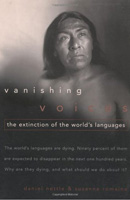 The somber Vanishing Voices welds anthropology and ecology to the study of earth's myriad tongues. Explore how both contribute to the decline and death of different languages, particularly indigenous ones subject to colonialism, imperialism and sprawl. Authors Daniel Nettle and Suzanne Romaine compellingly illustrate how preserving them benefits more than just their speakers.
The somber Vanishing Voices welds anthropology and ecology to the study of earth's myriad tongues. Explore how both contribute to the decline and death of different languages, particularly indigenous ones subject to colonialism, imperialism and sprawl. Authors Daniel Nettle and Suzanne Romaine compellingly illustrate how preserving them benefits more than just their speakers. -
Origins of the Specious by Stewart Kellerman and Patricia T. O'Connor:
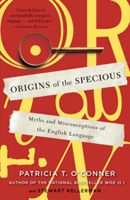 Grammar defines and refines as much as it confines, and this book discusses why English needs to jettison some of its arbitraries. Doing so, its main thesis argues, will set many writers free and loosen up the language for more casual usage: all provocative thoughts applicable to pretty much any super formalized tongue. Regardless of whether or not one agrees with the idea, it remains something very interesting for language lovers to debate.
Grammar defines and refines as much as it confines, and this book discusses why English needs to jettison some of its arbitraries. Doing so, its main thesis argues, will set many writers free and loosen up the language for more casual usage: all provocative thoughts applicable to pretty much any super formalized tongue. Regardless of whether or not one agrees with the idea, it remains something very interesting for language lovers to debate. -
Literally, the Best Language Book Ever by Paul Yeager:
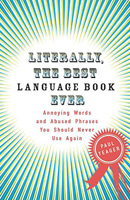 For the more conservative linguistics buff out there, Literally, the Best Language Book Ever distills humor from extremely common grammar and spelling mistakes. At the same time, though, it still educates readers looking for advice on polishing their writing. Even English language fans who think the rules need relaxing might find this perspective intriguing.
For the more conservative linguistics buff out there, Literally, the Best Language Book Ever distills humor from extremely common grammar and spelling mistakes. At the same time, though, it still educates readers looking for advice on polishing their writing. Even English language fans who think the rules need relaxing might find this perspective intriguing. -
Empires of the Word by Nicholas Ostler:
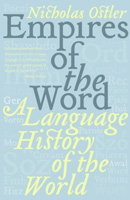 Hegemonies rise and fall for a number of reasons, but language undoubtedly plays an integral role in this social, political and economic phenomenon. Pick up this gripping read and discover how history and linguistics intertwine so intimately they can never truly be torn apart. After all, exploring the past might very well shed some light on where today's most prominent languages might be headed.
Hegemonies rise and fall for a number of reasons, but language undoubtedly plays an integral role in this social, political and economic phenomenon. Pick up this gripping read and discover how history and linguistics intertwine so intimately they can never truly be torn apart. After all, exploring the past might very well shed some light on where today's most prominent languages might be headed. -
Faint Praise by Grace Pool:
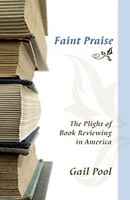 Book reviewers and literary critics analyze language and communication, either for money, love of reading or some combination. Although not explicitly linguistic, Grace Pool's reflections on how poorly many unqualified writers dissect literature undeniably has its place in the field. She proposes some intriguing potential reforms, including a code of ethics and expert reviewers, that might very well change the way periodicals and bloggers look at books.
Book reviewers and literary critics analyze language and communication, either for money, love of reading or some combination. Although not explicitly linguistic, Grace Pool's reflections on how poorly many unqualified writers dissect literature undeniably has its place in the field. She proposes some intriguing potential reforms, including a code of ethics and expert reviewers, that might very well change the way periodicals and bloggers look at books.
Great Information sharing.I am very happy to read this article .. thanks for giving us go through info.Fantastic nice. I appreciate this post Take a look at Massage Chair Black Friday 2020 Deals
ReplyDelete